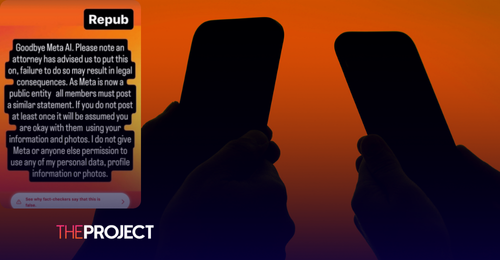The copypasta began to circulate at the beginning of September, showing a chunky wall of text pasted against a hazy orange-yellow gradient background. The text reads: “Goodbye Meta AI. Please note an attorney has advised us to put this on, failure to do so may result in legal consequences. As Meta is now a public entity all members must post a similar statement. If you do not post at least once it will be assumed you are okay with them using your information and photos. I do not give Meta or anyone else permission to use any of my personal data, profile information or photos.”
The copypasta hoax features all the trend’s hallmarks, making reference to the legal system, but just like the many copypasta chain-emails of the past, it does not actually work to protect you from Meta gaining access to your personal information.
While this may be blatantly obvious to more tech savvy internet users, thousands have fallen for the copypasta, including the likes of US actress Julianne Moore, former NFL quarterback Tom Brady, and Scottish actor James McAvoy.
Former American Idol contestant and drag queen Ada Vox warned users on Facebook on September 7 to stop sharing the message, posting: “Hackers use posts like that to target gullible and vulnerable people to find the easiest profiles to get into. … You are only putting a target on your back for hackers by sharing and making those ridiculous posts. The people at the highest risk for this are the older generation, so if you see them posting that, let them know.”
Last September, Meta released a statement explaining that the company use “publicly shared posts from Instagram and Facebook—including photos and text” to train its models but not “private posts” or “the content of your private messages with friends.”
A Meta spokesperson told MIT Technology Review in June that users who don’t want their content to be scraped can minimize the risk by switching their accounts to private mode.
Speaking on the matter, Emil Vazquez, a spokesperson for META, told Wired via email: “While we don’t currently have an opt-out feature, we’ve built in-platform tools that allow people to delete their personal information from chats with Meta AI across our apps.”
So, when it comes down to it, what can you really do to not have your publicly posted words and images used for Meta’s AI model? The only realistic answer at this point in time is to simply stop posting online.





























